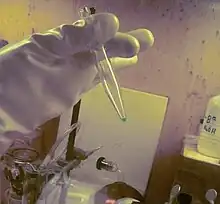Berkelium(III) nitrate
Berkelium(III) nitrate is the berkelium salt of nitric acid with the formula Bk(NO3)3. It commonly forms the tetrahydrate, Bk(NO3)3·4H2O, which is a light green solid. If heated to 450 °C, it decomposes to berkelium(IV) oxide and 22 milligrams of the solution of this compound is reported to cost one million dollars.
 A 22 milligram solution of berkelium(III) nitrate, photographed c. 2009/10 | |
| Names | |
|---|---|
Other names
| |
| Identifiers | |
3D model (JSmol) |
|
| |
| Properties | |
| Bk(NO3)3 | |
| Molar mass | 433.01 g/mol |
| Appearance | Light-green solid[1] |
| Melting point | 450 °C (842 °F; 723 K)[1] decomposes |
| Solubility | Soluble in nitric acid |
| Hazards | |
| Occupational safety and health (OHS/OSH): | |
Main hazards |
Radioactive |
Except where otherwise noted, data are given for materials in their standard state (at 25 °C [77 °F], 100 kPa).
Infobox references | |
Production and uses
Berkelium(III) nitrate is produced by the reaction of berkelium metal, the hydroxide,[1] or chloride[2] with nitric acid.[1] This compound has no commercial uses, but was used to synthesize the element tennessine. The aqueous compound was painted onto a titanium foil and was bombarded with calcium-48 atoms to synthesize the element tennessine.[3]
This compound is used as a pathway to pentavalent berkelium compounds by the collision-induced dissociation of this compound do produce BkO2(NO3)2– which contains berkelium in the +5 oxidation state.[2]
References
- Haire, R. G., Proc. Rare Earth Res. Conf., loth, Carefree, Arizona, April-May, p. 882 (1973) doi:10.2172/4549027
- Attila Kovács; Phuong D. Dau; Joaquim Marçalo; John K. Gibson (2018). "Pentavalent Curium, Berkelium, and Californium in Nitrate Complexes: Extending Actinide Chemistry and Oxidation States". Inorganic Chemistry. ACS Publications. 57 (15): 9453–9467. doi:10.1021/acs.inorgchem.8b01450. OSTI 1631597. PMID 30040397. S2CID 51717837.
- J. B. Roberto; K. P. Rykaczewski (2016). "Discovery of element 117: Super-heavy elements and the "island of stability"". Separation Science and Technology. 53 (12): 1813–1819. doi:10.1080/01496395.2017.1290658. OSTI 1408011. S2CID 99111297.